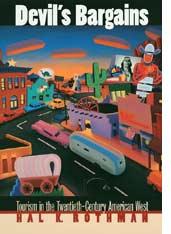
All rights reserved. Copyright © 1998 by University of Kansas Press. Cover illustration: Where the Wild West Went, © 1990 by Stephen Morath. All rights reserved.
The copyright holder reserves, or holds for their own use, all the rights provided by copyright law, such as distribution, performance, and creation of derivative works.
Rothman, Hal K. Devil’s Bargains: Tourism in the Twentieth-Century American West. Lawrence: University Press of Kansas, 1998. Tourism has been a blessing for many, bringing economic and cultural prosperity to communities without obvious, alternative means of support, or allowing towns on the brink of extinction to renew themselves. Yet the costs on more intangible levels may be said to outweigh the benefits. Could tourism be a devil’s bargain in the making? Hal Rothman examines the effect of twentieth-century tourism on the Western United States, exposing the industry’s darker side. He tells how tourism evolved from Grand Canyon rail trips to Sun Valley ski weekends and Disneyland vacations, and how the post–World War II boom in air travel and luxury hotels capitalized on a surge in discretionary income for many Americans, combined with newfound leisure time. Rothman argues that tourism often results in a redistribution of wealth and power to “outsiders” and therefore represents a new form of colonialism. By depicting the nature of tourism in the American West through true stories of places and individuals that have felt its grasp, Rothman documents not only the effects of tourism but provides an enlightened explanation of the shape these changes take. (Based on University of Kansas Press website text). Hal K. Rothman (1958–2007) was Professor of History at the University of Nevada, Las Vegas.

